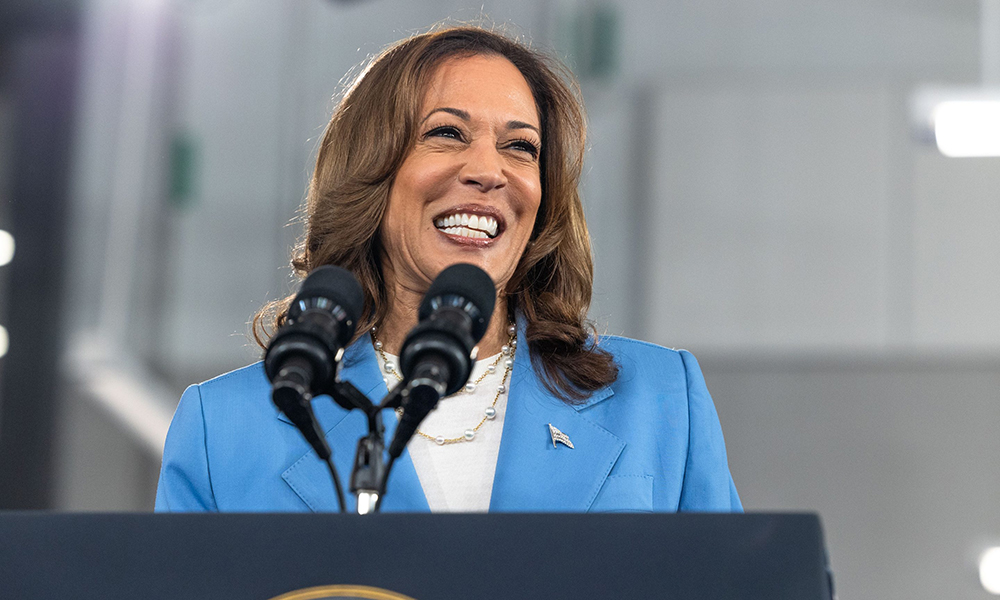
美国前总统唐纳德·特朗普的竞选前景,已经对市场产生了影响。
投资银行麦格理(Macquarie)最近的报告称,所谓的“特朗普交易”,即在特朗普胜选后可能带来回报的一系列投资交易,已经开始减少。
其中最著名的“特朗普交易”之一是押注美元走强。但截至周三,美元DX-Y指数(该指数衡量美元兑一揽子其他货币的汇率)目前维持在2024年的低点。8月份迄今为止,该指数已经跌至低于3%。
麦格理表示,现在随着副总统哈里斯胜选的可能性越来越高,美元可能进一步贬值。
麦格理全球外汇与汇率策略师蒂埃里·维兹曼对《财富》杂志称:“美元走软的部分原因是‘特朗普交易’减少。我们认为,特朗普交易的前提是美国的通货膨胀加剧和进一步加息,为美元升值提供支撑。”
麦格理已经认定,美元的价值低于其应有的水平。有一些有利于美元的情况,包括亚洲股市的连续下跌和英国与欧元区央行的降息等,但这些因素并没有提升美元的相对价值。
维兹曼写道:“我们认为,自8月初以来美元走弱有些奇怪,因为在此期间,美国的经济数据(如零售销售额、首次申领失业补助的人数、服务业ISM指数等)均显示,在7月底和8月初对经济衰退的担忧之后,美国经济应相对强劲。”
“哈里斯势头”
维兹曼和他的团队认为,这背后的原因是投资者决定放弃“特朗普交易”,因为他们认为这位候选人可能无法获胜,将使“特朗普交易”无法实现。维兹曼指出,在现任总统乔·拜登宣布不会争取民主党提名一周后,特朗普交易马上开始减少。几周后,8月初公布的首批民调显示哈里斯的支持率领先特朗普,美元指数开始下跌。维兹曼认为,这是证明特朗普交易正在减少的间接证据。
麦格理认为,哈里斯参与竞选掀起的势头,随着美联储降息将继续使美元走弱。麦格理将这种势头称为“哈里斯势头”。麦格理称,随着民主党全国代表大会的召开,哈里斯的民调支持率在会后反弹,甚至会加快美元贬值。
放弃特朗普交易,似乎意味着至少一些投资者对特朗普在11月入主白宫失去了信心。然而距离大选还有几个月时间,任何结果都有可能。投资公司DWS的高级政治策略师弗兰克·凯利指出,今年的选举形势最近发生了重大变化,因此选举结果更难预测。他说道:“7月份特朗普风光无限,8月份哈里斯出尽风头,而9月份双方的竞争将异常激烈。”
这种不确定性以及其他因素导致投资者放弃了特朗普交易。最近的民调显示,两位候选人的支持率相差1至2个百分点。哈里斯的民调支持率最近开始领先,在此之前特朗普的支持率遥遥领先于拜登,他似乎已经胜券在握。由于无法押注一个确定的结果,因此投资者调整了策略。
特朗普胜选可能迫使美联储支撑美元
迄今为止,投资者一直将特朗普与美元走强联系在一起,因为他们认为特朗普的优先事项是全面加征关税、大幅减少移民和减税,这会引发全面通胀,反过来迫使美联储维持更高利率,提高美元在国际货币市场上的相对价值。
维兹曼写道:“我们认为,基本上,特朗普比民主党政府更有利于更强势的美元。这是因为特朗普的核心政策——减税、限制移民和加征关税等,似乎将加剧通胀,进而使政策利率维持在更高水平。”
讽刺的是,特朗普本人却并不愿意看到强势美元。特朗普曾经认为,美元过于强势,导致外国人购买美国商品的成本过高。他在7月对彭博社表示:“我们存在一个严重的货币问题。”
“现在他们将开始在政策问题上相互攻击”
尽管如此,大多数投资者和经济学家都预测特朗普的政策会适得其反。维兹曼在报告中写道:“市场和我们的观点都是,与哈里斯相比,特朗普的政策将与更高政策利率息息相关。”
哈里斯在参与竞选初期,在政策问题上的立场一直相对模糊。但上周,她开始更详细地阐述自己的政策。迄今为止,她在经济方面的主张包括:呼吁加强对消费品过度涨价的监管;增加房屋库存;以及取消对小费征税(特朗普首先提出了这种观点)。
哈里斯的竞选团队透露,未来几周将会有更多政策细节公布。正在召开的民主党全国代表大会,可能成为哈里斯公布更广泛的经济政策的起点。政治策略师凯利认为,随着哈里斯公布更多政策细节,大选将进入下一个阶段。他说道:“他们将开始在政策问题上相互攻击,而不是继续进行人身攻击。”(财富中文网)
译者:刘进龙
审校:汪皓
美国前总统唐纳德·特朗普的竞选前景,已经对市场产生了影响。
投资银行麦格理(Macquarie)最近的报告称,所谓的“特朗普交易”,即在特朗普胜选后可能带来回报的一系列投资交易,已经开始减少。
其中最著名的“特朗普交易”之一是押注美元走强。但截至周三,美元DX-Y指数(该指数衡量美元兑一揽子其他货币的汇率)目前维持在2024年的低点。8月份迄今为止,该指数已经跌至低于3%。
麦格理表示,现在随着副总统哈里斯胜选的可能性越来越高,美元可能进一步贬值。
麦格理全球外汇与汇率策略师蒂埃里·维兹曼对《财富》杂志称:“美元走软的部分原因是‘特朗普交易’减少。我们认为,特朗普交易的前提是美国的通货膨胀加剧和进一步加息,为美元升值提供支撑。”
麦格理已经认定,美元的价值低于其应有的水平。有一些有利于美元的情况,包括亚洲股市的连续下跌和英国与欧元区央行的降息等,但这些因素并没有提升美元的相对价值。
维兹曼写道:“我们认为,自8月初以来美元走弱有些奇怪,因为在此期间,美国的经济数据(如零售销售额、首次申领失业补助的人数、服务业ISM指数等)均显示,在7月底和8月初对经济衰退的担忧之后,美国经济应相对强劲。”
“哈里斯势头”
维兹曼和他的团队认为,这背后的原因是投资者决定放弃“特朗普交易”,因为他们认为这位候选人可能无法获胜,将使“特朗普交易”无法实现。维兹曼指出,在现任总统乔·拜登宣布不会争取民主党提名一周后,特朗普交易马上开始减少。几周后,8月初公布的首批民调显示哈里斯的支持率领先特朗普,美元指数开始下跌。维兹曼认为,这是证明特朗普交易正在减少的间接证据。
麦格理认为,哈里斯参与竞选掀起的势头,随着美联储降息将继续使美元走弱。麦格理将这种势头称为“哈里斯势头”。麦格理称,随着民主党全国代表大会的召开,哈里斯的民调支持率在会后反弹,甚至会加快美元贬值。
放弃特朗普交易,似乎意味着至少一些投资者对特朗普在11月入主白宫失去了信心。然而距离大选还有几个月时间,任何结果都有可能。投资公司DWS的高级政治策略师弗兰克·凯利指出,今年的选举形势最近发生了重大变化,因此选举结果更难预测。他说道:“7月份特朗普风光无限,8月份哈里斯出尽风头,而9月份双方的竞争将异常激烈。”
这种不确定性以及其他因素导致投资者放弃了特朗普交易。最近的民调显示,两位候选人的支持率相差1至2个百分点。哈里斯的民调支持率最近开始领先,在此之前特朗普的支持率遥遥领先于拜登,他似乎已经胜券在握。由于无法押注一个确定的结果,因此投资者调整了策略。
特朗普胜选可能迫使美联储支撑美元
迄今为止,投资者一直将特朗普与美元走强联系在一起,因为他们认为特朗普的优先事项是全面加征关税、大幅减少移民和减税,这会引发全面通胀,反过来迫使美联储维持更高利率,提高美元在国际货币市场上的相对价值。
维兹曼写道:“我们认为,基本上,特朗普比民主党政府更有利于更强势的美元。这是因为特朗普的核心政策——减税、限制移民和加征关税等,似乎将加剧通胀,进而使政策利率维持在更高水平。”
讽刺的是,特朗普本人却并不愿意看到强势美元。特朗普曾经认为,美元过于强势,导致外国人购买美国商品的成本过高。他在7月对彭博社表示:“我们存在一个严重的货币问题。”
“现在他们将开始在政策问题上相互攻击”
尽管如此,大多数投资者和经济学家都预测特朗普的政策会适得其反。维兹曼在报告中写道:“市场和我们的观点都是,与哈里斯相比,特朗普的政策将与更高政策利率息息相关。”
哈里斯在参与竞选初期,在政策问题上的立场一直相对模糊。但上周,她开始更详细地阐述自己的政策。迄今为止,她在经济方面的主张包括:呼吁加强对消费品过度涨价的监管;增加房屋库存;以及取消对小费征税(特朗普首先提出了这种观点)。
哈里斯的竞选团队透露,未来几周将会有更多政策细节公布。正在召开的民主党全国代表大会,可能成为哈里斯公布更广泛的经济政策的起点。政治策略师凯利认为,随着哈里斯公布更多政策细节,大选将进入下一个阶段。他说道:“他们将开始在政策问题上相互攻击,而不是继续进行人身攻击。”(财富中文网)
译者:刘进龙
审校:汪皓
The election prospects of former President Donald Trump are already having an effect on the markets.
So-called Trump trades, a series of investments set to pay off should he get reelected, have started to unwind, according to a recent note from investment bank Macquarie.
One of the most prominent of such trades has been a bet on a stronger U.S. dollar. But as of Wednesday, the dollar’s DX-Y index (which measures the dollar against a basket of other currencies) is hovering right around its 2024 low. It’s fallen just under 3% so far in August.
Now, with the victory of Vice President Kamala Harris looking more likely, the dollar could weaken further, Macquarie said.
“The weakness is partly attributable to the unwinding of the ‘Trump trade,’ we believe, which had been built on the premise of more inflation and higher interest rates in the U.S., which would support the USD,” Macquarie global FX and rates strategist Thierry Wizman told Fortune.
Macquarie already believed the dollar was weaker than it should have been. There were favorable indicators for the dollar, including a series of slumps in Asian stock markets and the central banks of the U.K. and the eurozone both cutting interest rates. But none of them raised the relative value of the dollar.
“That the U.S. dollar has weakened since early August is a bit weird, in our view, as it has come during a period in which the U.S. data (retail sales, initial claims, services ISM) has pointed to renewed relative strength in the U.S., following the worries about a lapse into recession during late July and early August,” Wizman wrote.
‘Kamala-mentum’
The explanation, Wizman and his team concluded, was that investors had decided to walk away from the “Trump trades” because they think the candidate who would make them happen might not win. Wizman points to the fact that many of the Trump trades started to unwind in the week immediately following President Joe Biden’s announcement that he wouldn’t seek the Democratic Party’s nomination. A few weeks later, in early August when the first polls showing Harris overtaking Trump came out, the DXY sagged. That was more circumstantial evidence that the Trump trades were indeed unwinding, according to Wizman.
The Harris campaign’s momentum, which Macquarie dubbed “Kamala-mentum,” would continue the weakening of the U.S. dollar as the Fed cuts interest rates, Macquarie says. With the Democratic National Convention in full swing, a post-convention bounce in the polls for Harris could even accelerate the dollar’s fall, according to Macquarie.
Backing off from the Trump trade seems to indicate that at least some investors are losing faith in Trump’s chances come November. However, with several months to go until the election any outcome is far from a foregone conclusion. Especially in a race such as this year’s that was so recently upended, according to Frank Kelly, senior political strategist at investment firm DWS. “July was Trump’s month, August was Harris’s month, and September is going to be an all-out brawl,” he said.
The uncertainty as much as anything else is contributing to the pullback from the Trump trades. The latest polls show the two candidates within one to two percentage points of each other. Before Harris’s recent lead in some polls, Trump had been far ahead of Biden, seemingly cruising to a victory. No longer able to bet on a sure thing, investors adjusted.
A Trump victory might force the Fed to support the dollar
Until now investors had associated Trump with a stronger U.S. dollar because they believed his priorities of blanket tariffs, drastically curbing immigration, and cutting taxes would be broadly inflationary, and that in turn would force the Fed to keep rates higher—which would raise the dollar’s relative value on the international currency markets.
“In our view, Trump was perceived to be better—fundamentally—for a stronger U.S. dollar than a Democratic administration would be,” Wizman wrote. “That’s because Trump’s core policies—tax breaks, restrictions on immigration, tariffs—would be deemed to be more inflationary, thereby keeping policy rates higher than otherwise.”
Ironically, Trump himself doesn’t favor a strong dollar. In the past Trump has argued that the dollar is too strong, which made it too expensive for foreign buyers to purchase U.S. goods. “We have a big currency problem,” Trump told Bloomberg in July.
‘Now they’ll start battering each other with policy issues’
Despite that, the majority of investors and economists expect Trump’s policies to do the opposite. “The market’s perception—and ours—is that Trump’s policies should be associated with higher policy interest rates than Harris’s,” Wizman wrote in his note.
Throughout the early days of her campaign, Harris has been relatively vague on policy. However, she’s started rolling out more details over the past week. So far, her economic views include advocating for regulations against excessive price increases on consumer goods; building more housing stock; and eliminating taxes on tips (an idea first introduced by Trump).
The Harris campaign has telegraphed that still more policy details will arrive over the coming weeks. The ongoing Democratic National Convention could serve as a starting point for a broader policy rollout. Kelly, the political strategist, thinks once that happens the election campaign will move into its next phase. “Now they’ll start battering each other with policy issues rather than it being personal,” he said.






